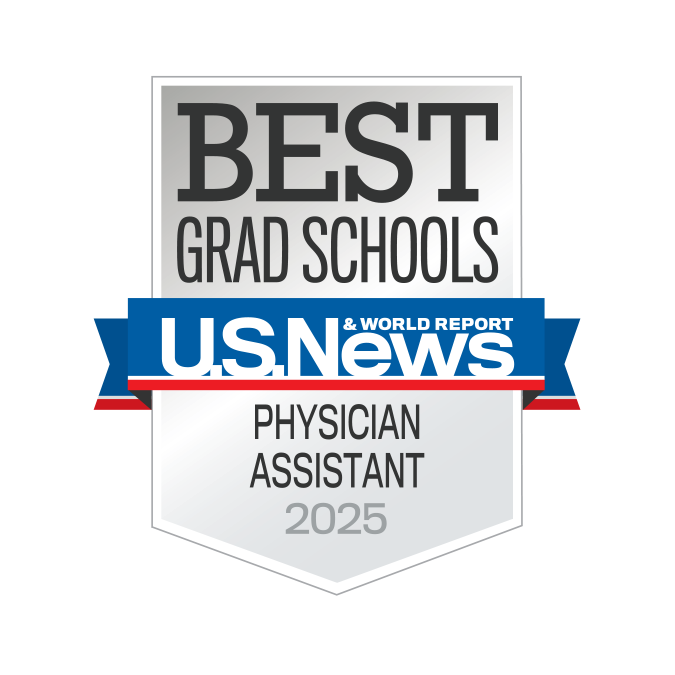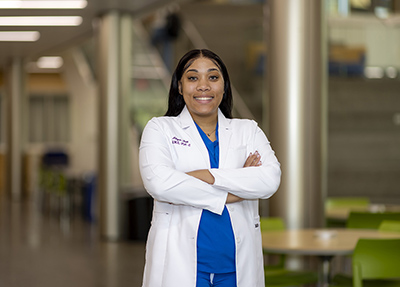Academics–Master of Health Services—Physician Assistant Studies Degree
Welcome to the Physician Assistant (PA) program at the Betty Irene Moore School of Nursing at UC Davis
 The Master of Health Services — Physician Assistant (PA) Studies Degree Program at the Betty Irene Moore School of Nursing at UC Davis prepares future PAs to become primary care providers who advance health in California’s underserved communities.
The Master of Health Services — Physician Assistant (PA) Studies Degree Program at the Betty Irene Moore School of Nursing at UC Davis prepares future PAs to become primary care providers who advance health in California’s underserved communities.
Based in Sacramento, this 27-month, full-time program is built on the principles of interprofessional education, leadership, and health equity. With a strong emphasis on team-based care, our program develops collaborative, socially conscious clinicians ready to improve outcomes in diverse health care environments.
Fast facts
- Type (full vs. part-time): full-time
- Duration: 27 months
- Format: In-person, Monday-Friday
- Objective: to prepare physician assistants to provide high-quality patient-centered care with compassion and integrity
- Outcomes: clinicians who will play a crucial role in the health care system improving the health of patients and communities
- Application period: Mid-April – August 1
About the program
Our PA program is designed to prepare clinicians who are responsive to the needs of an evolving health care system. Students benefit from rigorous academic training, immersive clinical experiences, and high-tech simulation. The curriculum emphasizes case-based learning, systems thinking and technology, and draws upon a growing body of research that supports collaborative, interprofessional care.
Students are part of a dynamic learning environment alongside peers in nursing and medicine. Supported by faculty across multiple disciplines, including nursing, medicine and pharmacy, students gain experience that prepares them to lead, collaborate and innovate.
About the PA profession

PA graduate shares how UC Davis goes beyond the books
Aliyah Bell, a graduate of the PA program, serves marginalized populations and advocates for those who need it most.
Read how the PA program prepared Aliyah for a life as a PA in practice
PAs (physician associates/physician assistants) are licensed clinicians who practice medicine in every specialty and setting.
Trusted, rigorously educated and trained healthcare professionals, PAs are dedicated to expanding access to care and transforming health and wellness through patient-centered, team-based medical practice. PAs conduct physical exams, diagnose and treat illnesses, order and interpret tests, counsel patients, assist in surgery, and prescribe medications. They work across a broad range of specialties and clinical settings.
The PA role continues to grow as communities face shortages in primary care providers. With strong foundations in evidence-based practice, prevention, and patient education, PAs are well-positioned to meet the rising demand for accessible, high-quality care.
Program overview
This 27-month program includes academic coursework, simulation lab training and supervised clinical practice. The curriculum includes content in:
- Medical knowledge by organ system
- Clinical reasoning and problem-solving
- Interpersonal skills
- Pharmacology
- Clinical and technical skills
- Practice-based learning & improvement
- Professional practice for the PA
In the second year, students complete eight required five-week clinical rotations across California in the following specialties:
- Family Medicine
- Pediatrics
- Women’s health
- Psychiatry
- Emergency medicine
- Surgery
- Internal Medicine
- Selective/elective rotation
Students return to campus each quarter during their clinical year for continued training in medical knowledge, clinical & technical skills, clinical reasoning & problem-solving, and interpersonal skills. Clinical sites and preceptors are arranged for PA students by the Clinical Team at the Betty Irene Moore School of Nursing.
What we're looking for
The program welcomes applicants who are passionate about providing quality health care and dedicated to improving access and outcomes for underserved populations and communities. Ideal candidates are committed to:
- Interprofessional collaboration
- Leadership development
- Culturally responsive care
- Advancing health equity
We value applicants with diverse life experiences, cultural humility and a readiness to thrive in a fast-paced academic environment.
What we provide
- Interprofessional learning environment
- Supportive faculty and mentorship throughout the program
- Access to advanced simulation facilities and team-based learning
- Clinical rotation placements arranged by the school
- A three-day orientation to build community and prepare for success
- Student Wellness and Success Center
- Ongoing leadership development and professional advocacy training
Students are supported by the Nursing Science and Health-Care Leadership Graduate Group, an interprofessional team of faculty from disciplines such as nursing, medicine and pharmacy. The Sacramento-based campus offers state-of-the-art facilities and a vibrant community of learners.
Sign up to receive program updates, including application openings and upcoming information sessions.
Aligned with the school’s vision to advance health, the PA program educates clinicians who are prepared to lead and improve access to high-quality, culturally relevant care. Core values include:
- Leadership in clinical practice and systems change
- Inclusive, equity-driven health care delivery
- Collaborative, team-based education and care
- Community engagement and service
We prepare graduates to be change agents in the health care system — clinicians who don’t just practice medicine, but work to transform it.
Graduates of the PA program are equipped to:
- Deliver compassionate, evidence-based care
- Practice through collaboration on interprofessional teams
- Lead quality improvement and innovation efforts
- Serve in a wide variety of ambulatory and community-based settings
- Improve health outcomes and reduce disparities in underserved communities
Upon completion of the program, graduates are awarded the Master of Health Services — Physician Assistant Studies Degree and are:
- Eligible to sit for the Physician Assistant National Certifying Exam (PANCE), administered by the National Commission on Certification of Physician Assistants (NCCPA)
- Prepared to apply for licensure to practice as a certified physician assistant (PA-C) in California or other U.S. states
- Qualified to begin professional practice in a variety of clinical, academic or leadership roles across the health care system
- Full-time enrollment (12 units per quarter) is required
- Required courses for the master’s-degree program include a combination of core courses and electives.
- A comprehensive exam is required
- Physician assistant students are expected to complete the program in 27 months
- Physician assistant studies program degree requirements
- Essential abilities and technical standards for students






